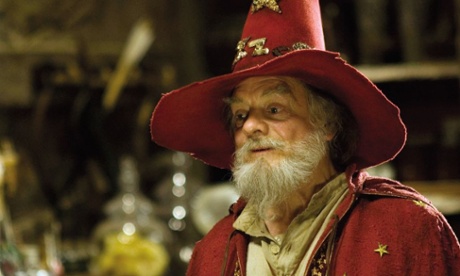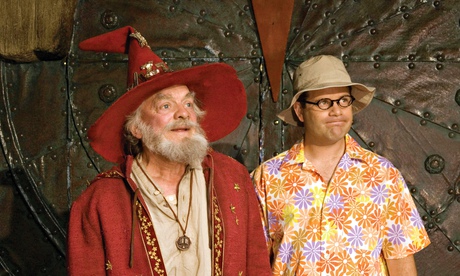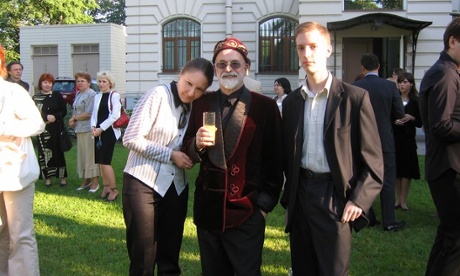Would you recommend The Colour of Magic as a first book to someone who has never read Terry Pratchett before? Is it a good place to start with this month’s Reading group?
Those aren’t questions that I’d have thought of asking two weeks ago. But now I realise that they are open to debate. Not least because there’s been a fair bit of back and forth about them here. The argument goes that since The Colour of Magic is not Pratchett’s finest work, to focus on it is to undersell him.
“I truly don’t understand why you think you are honouring a writer by picking a book you know is inferior to almost all the other books in the series,” said a contributor called Jantar.
I can see the point. I wouldn’t introduce someone to the Beatles with Please Please Me, I’d go straight for Revolver. But I’d still answer yes to both those questions. Even more so now that I’ve re-read The Colour of Magic, almost 30 years after it first introduced me to the delights of the Discworld.
I say yes partly because it’s going to be so interesting to compare this book to one of his later masterpieces and to see how Pratchett developed his writing as the years went on. Partly, because it’s already so fascinating to see the origins of the Discworld and the source of so many other stories. And partly, because this book is still good. It’s still more than worth reading in and of itself.
To take the last point first. The book contains, as the author himself once put it, some “boffo laughs”. The temptation, as always with Pratchett, is to start quoting at length. I’m going to give in to it, because those quotes are so much fun:
Some pirates achieved immortality by great deeds of cruelty or derring-do. Some achieved immortality by amassing great wealth. But the captain had long ago decided that he would, on the whole, prefer to achieve immortality by not dying.
My name is immaterial,” she said.
“That’s a pretty name,” said Rincewind.
Rincewind tried to force the memory out of his mind, but it was rather enjoying itself there, terrorising the other occupants and kicking over the furniture.
There are also plenty of jokes that are even funnier within the context of the book. Late on, the use of the word “circumfence” to describe the barrier around the edge of the Discworld’s outer seas had me snorting. There’s also a very good Big Bang joke – but I won’t say more for fear of spoiling it.
The Colour of Magic is also effective as a satire of pre-1990s fantasy conventions. Terry Pratchett explained on the BBC that it was “written in protest” about a genre that he loved, but contained “too many dark lords, too much lack of thought”. In a speech back in 1986, he also said: “It was an attempt to do for the classical fantasy universe what Blazing Saddles did for westerns.”
It was a successful attempt. As the failed wizard Rincewind and the proto-tourist Twoflower hurtle around the physically impossible, magically sustained geography of the Discworld, Pratchett makes sharp and telling points about the absurd skimpiness of female characters’ outfits, the daftness of riding on the backs of dragons, the ridiculousness of the average quest.
Yet while they may work, these digs also open up the biggest objection to reading The Colour of Magic. Whereas later Pratchett satirised the real world, here his target is both softer and more obscure. Jokes about characters with exclamation marks in their names and gags about specific fantasy books do require a certain amount of knowledge to work. It also doesn’t take a genius to point out that Fritz Leiber books are pretty silly.
But you don’t have to know anything about Fritz Leiber or any other fantasy specifics to enjoy this book. The really outstanding thing is how easily it overcomes the restrictions of genre and builds its own rules. And how fascinating those rules are.
One of the most notable things about coming back to The Colour of Magic after all these years is how it reads like a greatest hits collection. (And yes, there is a pleasingly Discworldlian paradox in the metaphor.) Dozens of what were to become favourite Pratchett inventions whizz by in the narrative. The city of Ankh-Morpork erupts from the map near fully formed. There are the assassins’ guilds, the thieves, the members of the Unseen University. And, of course, there is Death.
Death, Pratchett claimed, first appeared on the scene “solely for the purposes of a gag”. He wanted to riff on W Somerset Maugham’s 1933 story The Appointment in Samarra, in which a servant rides from Baghdad to Samarra to avoid Death. The servant saw Death make a gesture at him while in the market in Baghdad and so bolted, only to learn – the hard way – that Death had been expecting him in Samarra all along. The original gesture was Death indicating his surprise at seeing the servant in Baghdad. So, here, Death is surprised to find Rincewind in Ankh-Morpork when he’s expecting to see him later that evening 500 miles away. And I suppose that’s amusing if you know the Samarra story – but really, most readers won’t care because the really brilliant thing is the way Death talks in CAPITAL LETTERS and “in tones as deep and heavy as the banging of doors, far underground”. He’s immediately delightful and only gets better as the book progresses. By the time we learn that “if words had weight a single sentence from Death could anchor a ship” he already feels like a comedy classic.
You might say that Death becomes even more interesting in later books. His character is stronger, his attitudes harden even as his character becomes more lovably soft, the jokes are even better. There’s also the fact that Death doesn’t get much screentime in The Colour of Magic. Indeed, much of this novel reads like the Discworld on fast-forward. The plot – such as it is – is really just a series of accidents that speed the two leads through various strange parts of Pratchett’s universe. Events fly by. Ideas ping past. Characters hurtle on and off the stage and none of them is really developed.
Even Rincewind and Twoflower stay the same. Twoflower enables Pratchett to make some interesting points about the nature of tourism and power, and there are some fine jokes about his attempts to impose rational ideas (such as insurance) on a magical world. Rincewind is also always enjoyably bemused and grumpy. But essentially the two remain as flat as the Discworld itself. They’re there just to explore Pratchett’s fantastic geography and enable him to make jokes.
But you know what, all that’s fine by me. The jokes are already good. The world is already fascinating. And if things seem hurried, that’s OK because I know the pacing gets better later on. Indeed, The Colour of Magic is the perfect introduction because it leaves me hungry for more.
On which note, following the vote on which other Pratchett novel we should read this month, Night Watch has won by an overwhelming majority. (No fewer than 19 novels were nominated – which shows the breadth and depth of the appreciation Pratchett inspires.)
Finally, an enjoyable bit of admin. We have five copies of Night Watch to give away to the first five readers in the UK to post “I want a copy please” – along with a nice, constructive comment relevant to Pratchett – in the comments section below.
If you’re lucky enough to be one of the first to comment, don’t forget to email Laura Kemp with your address (laura.kemp@theguardian.com), as we can’t track you down ourselves. Be nice to her, too.











